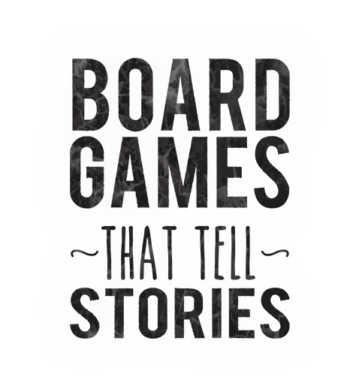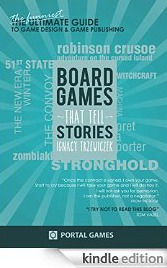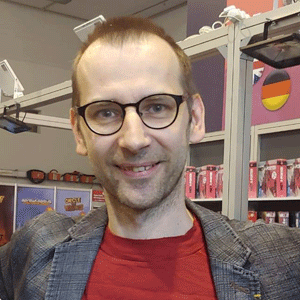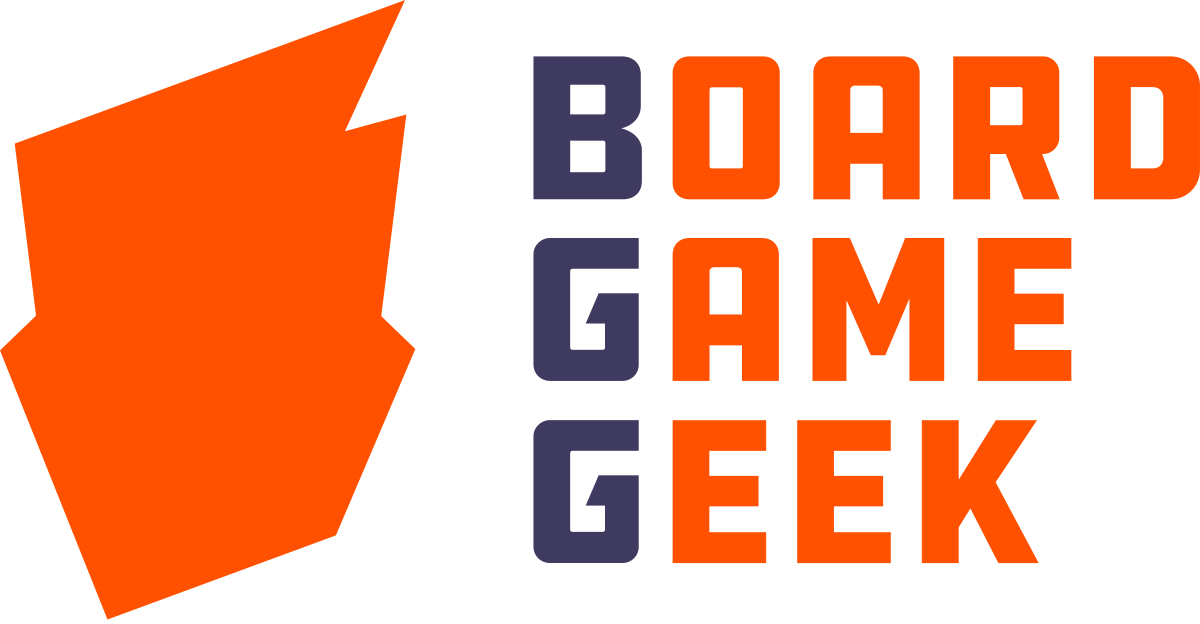The player and the designer
[I am happy to present you guest post by Michał Oracz, author of Neuroshima Hex, Witchcraft and Theseus. This is his first appereance and as far as I know, not the last one!]
I’m a little bit ashamed of that but I must admit I like to play my own games. Whether it is Neuroshima Hex on my smartphone or with real life opponents. Theseus I can play alone or with another player, three players or even in teams.
Witchcraft is the only game I don’t like to play. Because Witchcraft is unforgiving, a slightest mistake you make may cost you the whole game. The bitter feeling that I get after loosing will not be satisfied merely by saying ‘I had no luck with the tokens’. Unless I play solo – than Witchcraft is as pleasurable game as any other.
The eagerness with which I set up Hex or Theseus is suspicious… even for myself. I sit in front of my PC and struggle with some work that has temporarily burned out my enthusiasm and a whole container of inspiration. Hmm, a short break wouldn’t hurt, right? Maybe, a little bit of java power and a short Theseus/Hex match? I wonder what combos I’d put together this time?
I go the other room, I set up the game playing for both sides and in less then a quarter I’m playing a short game sipping my coffee. I always regret that there is no ‘save’ option in board games, especially if I come up with something nasty, so nasty it won’t probably happen again.
Borgo’s mutants totally immobilized by Hegemony’s troops.
The Scientists who are able to found a complete Space Hospital by the end of the game and in one turn they come back to their initial health level.
A construction that has an overpowered automated defense system that takes down enemy troops with just one shot, blasting them from the surface of the Space Station.
A contraption capable of controlling enemy units so that they behave like puppets, barely alive after a short time while the rest of them slowly drift in the outer space.
That’s why I have these urges to stop what I’m currently doing and spend some quality time with Theseus or Hex.
Can no notice what’s wrong with that?
I do. It’s just that I like to play my own games.
It is very, very, very unprofessional. Extremely unprofessional.
A designer should hate his own games. After hundreds of tests and months of creating he should feel sick whenever he sees his game.
It’s not the case with me. And that’s bad.
I like to play my own games because of one simple thing: I created them for myself. To my own liking.
If I were a professional game designer, I would behave like a pro from the very beginning. I would choose a solid theme that would be to almost everybody’s liking. I’d check how popular are the tags connected with are in the game search engines (Lovecraft and Zombie, my forever beloved motifs that became beloved by everybody else and with their popularity they always come up on the top!). I’d read blogs, forums and keep track of the trends and currently discussed mechanics. I would cruise between the testers I know and ask each one of them for an honest opinion, provided I’d be able to pin them down to a board game, whether they would be complete board game noobs, experienced players, extremely experienced authors or publishers.
If I were a professional game designer… See that’s the problem, in the first place I’m player of my own games.
I don’t start a project by saying ‘Hmm I’d like to create a game in which…’. I start with ‘Damn, I’d really enjoy playing a game in which…’.
As you can see theses are often very egocentric impulses.
In my head I have a collection of my dream games, the problem is that some of them are still only in my head. Although I keep on looking through the thousands of existing games some of my dreamed ones haven’t been yet created. It’s the case with board games, computer games and role playing games and that’s a pity because I’d really like to play them!
This is the only reason for my designing. More often than not I delay my normal work and I struggle with yet another version of my dream games, one of my ideal ones. I remake, correct, switch elements, start everything from the beginning because I know what should wait for me at the end. I’m a player with a very abnormal taste and I look for the perfect game for myself. To be more precise a few specific games. I know exactly what is it that I’d like to play! But there is no simple road leading from this knowledge to a ready-made game, at least I haven’t found it.
Finally the magic moment is upon me: here it is, I did it! I’ve got it! I created a good game, I can put my name on it, I’m 100% sure! It’s good enough! Here Ignacy have a look at it!
What does this mean? Just one simple thing. I forgot myself. I started to think as a pro designer: I prepared a solid product, let’s start the tests, let’s talk with the publisher, everything will change but the first stage is complete. Now it’s time for the other stages. Oh I know how it works, I know all too well. For twelve years we’ve been publishing games from the initial idea to a ready-made box. I took this path many times, through the smallest details, tiniest step in the long process of professional game designing and product preparation.
No. Stop. Not this time. It’s just a moment of weakness. I forgot myself and stopped searching for my perfect game. It will be just another title among thousands being published worldwide without any progress to my one true goal.
And than I-the designer get spanked and go for a sick vacation and the I-gamer come out. Merciless, demanding with an atypical taste. A player looking for a game ideal for himself. The best possible game for himself in a given genre and specified theme. I love retro-fantasy, horror, postapocalypse and most of all the claustrophobic sf horror taking place somewhere in space.
Than I look upon the prototype I’ve created once more. Is it for me? Will I loose myself in it and play without even a short break? Will I never get bored by it? Is there a similar game I’d like to play more than this one?
I picture myself after buying a box with this game inside. I’m a consumer. Player. I open, I read the instructions, I start. With a token or a character. I’m trying to see what can be done. What challenges await me, what limits and possibilities. Is this the real thing? The one I’ve been searching for? Can I really do all that I wanted with it? In it? If not that it needs a remake. It needs to once again land on the designing desk.
Is this a good method?
Should everybody share my gusto it would be. But they don’t.
This is a very bad method for professional game designers.
If I was ever to become a professional game designer I’d change it immediately and threw it into the deepest reaches of some long forgotten void. I would instead close the first stage of the designing process as soon as possible and head on to the next ones because this is where the final product is born.
Meanwhile I create games for myself and I keep searching for those few ones about which I’m sure how they should work and look like.
When I will finally repair, correct and polish these few projects that are being grinded all the time I will than have my perfect games. And I will play them all the time.
***
Is that all?
Nope. There is one more thing. I’d like to apologize to you all, my good folks. I lied to you. I totally lied to you. A bloggers privilege, isn’t it?
I’m not an exception among game designers, as I’ve tried to persuade you a moment ago.
Each designer has his own code, own style. Often a very particular style, like the one that music bands sometimes have or like a painter, illustrator or a writer.
Each and every designer creates not for everybody but for the people who share his gusto and expectations as far as games are concerned. At least at the prototype stage.
We all try to make the perfect game, the best one that is in it’s genre. And we all do what we can to accomplish that.
Each one of us prays for the largest possible number of players with the same taste. To become the Family Feud master of this domain, it’s not important what you know, it’s important that you think like the rest. So that when somebody asks you on a street: ‘what does a cow drink?’ you will answer with all confidence: ‘milk!’. Just like the majority.
If by some miracle your taste will be similar to the taste of a large number of players, if the later stages of testing and the publishing compromise will only adjust the game to be even more suitable for the demands of an even greater number of players and the game will be a spectacular success, no designer will cry because of this.
Even thou I’m searching for my ideal games, I wouldn’t cry as well.


 I strongly believe that good board game is the one that tells a good story. You play it and suddenly you are sucked into it, you feel chills on the skin. Emotions grow. In a moment you defend castle. You hear roar of warriors. You smell boiling oil. You are into it.
That's how I design my games. I always want to tell a good story. I want players to be into it. As deep as possible.
I strongly believe that good board game is the one that tells a good story. You play it and suddenly you are sucked into it, you feel chills on the skin. Emotions grow. In a moment you defend castle. You hear roar of warriors. You smell boiling oil. You are into it.
That's how I design my games. I always want to tell a good story. I want players to be into it. As deep as possible.




I was just curious how you go about playing Theseus alone? Do you favor one side and leave the other up to chance or do you play both sides to win? I have tried favoring one side and using a die to roll for the best possible options for the other side. It works okay but if there’s another more effective method to operate an enemy AI, I’d love to hear about it. Thanks!